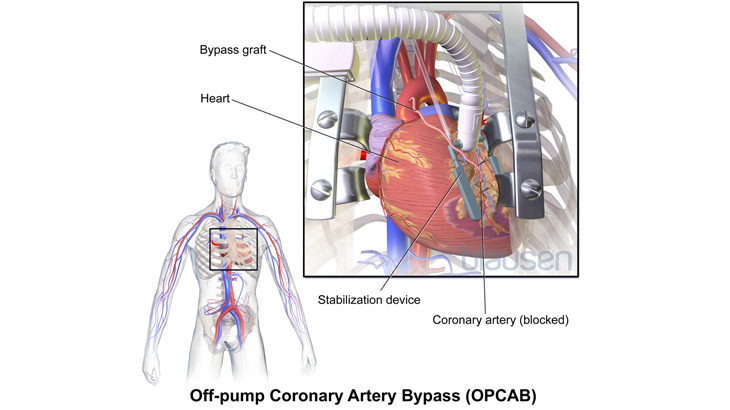Pioneering surgery done without stopping the heart
Surgeons in our Cardiac Surgery Program developed and perfected off-pump bypass surgery, also known as beating-heart bypass surgery, in the 1990s. We now use it for nearly half of all coronary artery bypass surgeries that our doctors perform.
Traditional coronary artery bypass surgery involves stopping the heart and lungs during the procedure and using a heart-lung machine to pump blood and oxygen throughout the body. But during off-pump bypass surgery, your surgeon stabilizes and works on a specific area of the heart while the rest of your heart pumps normally.
Our expertise with this treatment option means more patients can have bypass surgery with many benefits over the traditional procedure, such as:
- Fewer complications for the kidneys and lungs
- Less need for blood transfusions
-
Lower risk of stroke
- Shorter hospital stays and recovery
Procedure
You’ll receive general anesthesia to make you sleep during the surgery. After removing the blood vessel to serve as a graft for the bypassed artery, your surgeon will make an incision to access your heart and the coronary arteries.
Next, your surgeon will place prongs on your heart to stabilize the area being worked on during the procedure. This allows the rest of your heart to beat normally. The surgeon will attach one end of the graft just below the diseased part of the artery and the other end to a tiny opening made in the aorta. This diverts blood flow around the blocked artery.
Recovery after off-pump bypass surgery is shorter than traditional bypass surgery, but you’ll still need to stay in the hospital for several days afterward. Your doctor may recommend that you take part in cardiac rehabilitation to help you recover safely and effectively and reduce your risk for future heart problems.

Conditions
Coronary Artery Disease
Coronary artery disease is the most common type of heart disease in the United States.
Coronary Calcification
Coronary calcification occurs when calcium builds up in the plaque found in the walls of the coronary arteries, which supply blood to the heart muscle.
Heart Attack (Myocardial Infarction)
A heart attack, also known as a myocardial infarction (MI), requires emergency medical attention. A heart attack happens when the flow of blood to the heart is blocked.
Tests
Cardiac Catheterization
Cardiac catheterization is a minimally invasive way to diagnose and treat a variety of heart and vascular conditions by guiding thin, flexible tubes called catheters through blood vessels to problem areas.
Chest X-ray
Chest X-rays use a small dose of radiation to create pictures of the structures inside the chest, including the lungs, heart, and chest wall.
Computerized Tomography (CT) Scan
The cardiac computed tomography scan, or cardiac CT, uses X-rays to create three-dimensional images of your heart and blood vessels.
Echocardiogram
An echocardiogram uses high-frequency sound waves to create images of your heart.
Electrocardiogram (ECG)
An electrocardiogram, also known as an ECG, measures the heart’s electrical activity.
Magnetic Resonance Imaging (MRI)
Magnetic resonance imaging, better known as cardiac MRI, is a combination of radio waves, magnets, and computer technology to create images of your heart and blood vessels.
Stress Tests
Stress tests are used to assess how your heart works during physical activity. There are several types of stress tests, including treadmill or bike stress tests, nuclear stress tests, stress echocardiograms, and chemically induced stress tests.
Our providers
Location: Change location Enter your location
-
Brenda Jean Beckett, CRNP
Cardiothoracic Surgery
-
Cierra Bruck, PA-C
Cardiac Surgery
-
Ashley Chenoweth, AGACNP-BC
Cardiac Surgery
-
Jeffrey E. Cohen, MD
Cardiac Surgery
-
Laura Lee Cramer-Joyce, CRNP
Cardiac Surgery
-
Carolin Hanna, AGACNP-BC
-
Rachel E Harrison, MD
Cardiac Surgery
-
Maria Gina Heyrana, CRNP
Cardiac Surgery
-
Dureaden Khan, PA
Cardiac Surgery
-
Kathleen J. Lavery, ACNP-BC, MSN, APRN
Cardiac Surgery
-
Thomas Edward MacGillivray, MD
Cardiac Surgery
-
Eugenia M. McDonnell, CRNP
Cardiac Surgery
-
Stacey Elizabeth Miller, ANP-BC
Cardiac Surgery
-
Nicole M Monte-Bovi, AGACNP-BC
Cardiac Surgery
-
Susan Thornton Oyola, AGACNP-BC
Cardiac Surgery
-
Christian Charles Shults, MD
Valvular Disease Cardiology, Structural Heart Disease Cardiology & Cardiac Surgery
Our locations
Distance from Change locationEnter your location
MedStar Union Memorial Hospital
201 E. University Pkwy. Baltimore, MD 21218
MedStar Washington Hospital Center
110 Irving St. NW Washington, DC 20010
Additional information
Cardiac rehabilitation
Recover faster and improve your quality of life after heart disease or treatment with help from our exercise physiologists, physical therapists, and dietitians.
Ask MedStar Heart & Vascular Institute
Have general questions for our heart and vascular program? Email us at AskMHVI@medstar.net. If you have clinically-specific questions, please contact your physician’s office.









